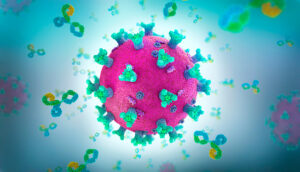Three recent studies have analyzed anti-SARS-CoV-2 antibodies among individuals with asymptomatic and mild SARS-CoV-2 infections, and they have found that antibody responses are variable and short lived. In 37 asymptomatic, RT-PCR positive cases in China (median age 41 years, 40% male), anti-spike protein IgG levels were significantly lower compared to matched, mildly symptomatic individuals in the acute phase of infection. Furthermore, IgG levels decreased over time for both asymptomatic (median decrease 71%) and mildly symptomatic cases (median decrease 76%), and 40% and 13% of asymptomatic and symptomatic cases became seronegative, respectively. A second study from California analyzed anti-spike receptor IgG antibodies in 34 patients (mean age 43 years) with mild COVID-19 a mean of 37 days and 86 days after onset of illness; results suggest a rapid decay of IgG antibodies corresponding to a half-life of about 36 days over the study period. Another study from Maryland found substantial heterogeneity in antibody responses among 126 potential convalescent plasma donors (median age 42 years) with mild to moderate disease; older age, hospitalization for COVID-19, and male sex were all associated with higher titers. A better understanding of the development and longevity of anti-SARS-CoV-2 antibodies in both symptomatic and asymptomatic individuals is urgently needed in order to gain a better understanding of this virus and develop effective therapeutics such as convalescent plasma.
References:
- Long QX, Tang XJ, Shi QL, Li Q, et al. Clinical and immunological assessment of asymptomatic SARS-CoV-2 infections. Nature Medicine 2020
- Ibarrondo FJ, Fulcher JA, Goodman-Meza D, Elliott J, et al. Rapid decay of anti-SARS-CoV-2 antibodies in person with mild Covid-19. The New England Journal of Medicine 2020
- Klein SL, Pekosz A, Park HS, Ursin RL, et al. Sex, age, and hospitalization drive antibody responses in a COVID-19 convalescent plasma donor population. MedRxIv 2020

